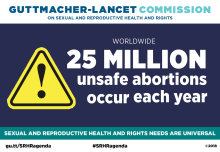The Guttmacher Institute documents the need for, access to and use of contraceptives, as well as the impacts of that use, including the health, economic and social benefits of fulfilling the unmet need for contraception. The Institute’s research and advocacy work addresses the need to support investment in the development of new methods and in high-quality, affordable family planning services that provide access to a full range of methods, comprehensive and accurate information, and effective counseling.







